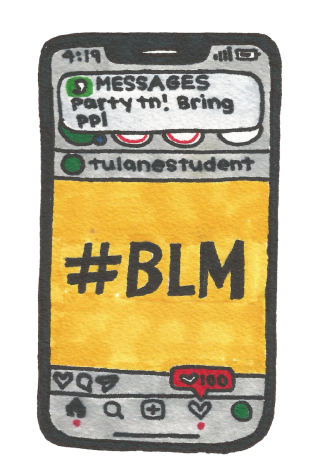OPINION | College is not about getting rich

America is facing a reckoning. Inequality in the U.S. has reached levels not seen since before the Great Depression. A 2016 Brookings Institute analysis found that the average white family had more than 10 times the wealth of the average black family. Fates dictate futures before birth. Children grow up in gated communities or impoverished ones, college often serving as the only beacon of upward mobility. But often higher education preserves wealth for the wealthy and offers debt to the lesser off, promising future returns with its fingers crossed behind its back.
Tulane University, along with many similar institutions, neglects the opportunity to function as a progressive and equitable example of the power of education. Sixty-nine percent of Tulane students come from the top 20% of wealth with a median family income of $180,700. Additionally, 70.9% of the student population is white. If these demographics are the future, then the future does not offer progress or equity, but a continuation of the oligarchical preservation of wealth and power.
Universities and their students have an obligation to encourage equity and social mobility. Things must change, both in admissions processes and the classroom. An education should be obtained with the goal of bettering society, not simply maximizing an individual’s potential to amass capital.
Private universities allow the elite to analyze society from a critical distance rather than emboldening young people from any background to go out in the community and make a change. Everyday there are bodies in the street protesting police brutality, housing discrimination, income ineqality and a variety of other issues that effect the working class. Students learn about these movements in the classroom and pass judgement. Many Tulane students have never experienced these forms of oppression or even been surrounded by those from marginalized communities, and therefore often lack the ability to empathize enough to care.
There are immigrants harvesting avocados in the fields of California, while Tulane Students munch on meal-plan avocado toast outside of Le Gourmet and brainstorm weekend plans. It is doubtful that a sheltered white male professor can open the mind of a sheltered young person more than a immigrant agricultural worker speaking on the oppression they face.
Furthermore, Tulane students live in a city that remains redlined despite the end of legal racial segregation in the U.S. The same streets Tulane students know and love during Mardi Gras have suffered incomprehensible traumas. From Hurricane Katrina to the impact of the coronavirus pandemic, New Orleanians are suffering.
When this year’s incoming freshman arrived on campus, they were told that they were the future. They were reminded of being among the best, the brightest and the most qualified. The crowd was filled with white faces and white bodies, adorned with Gucci belts and Vineyard Vines.
Among many Tulane students there is a deafening silence regarding activism and the responsibility of those with privilege to do better. However, conversations about second homes and the pros and cons of rushing abound. This negligence begs the question, what is the social responsibility of the student? Even if the Tulane administration resists change, how can individuals use their privilege not to simply self benefit, but to aid those left behind?
Education has the potential to liberate the mind and hone the skills necessary to make change. Education also has the potential to make one more selfish, entitled and ignorant. Toni Morrison perfectly encapsulates the student’s moral obligation to society: “When you get these jobs that you have been so brilliantly trained for, just remember that your real job is that if you are free, you need to free somebody else. If you have some power, then your job is to empower somebody else. This is not just a grab-bag candy game.”
A Tulane education can lift a student out of poverty and into the middle class. A Tulane education can imbue a person with passion and knowledge. But those born into privilege must be constantly vigilant against entitlement and ignorance. There is a moral obligation to fight for a just and equitable society; students can harness privilege to make a change, not just money.
Your donation will support the student journalists of Tulane University. Your contribution will allow us to purchase equipment and cover our annual website hosting costs.



Baffled Student • Sep 21, 2020 at 11:09 am
Hot take: The Tulane student body is actively pushing for a communist revolution and should be considered treasonous to the state.